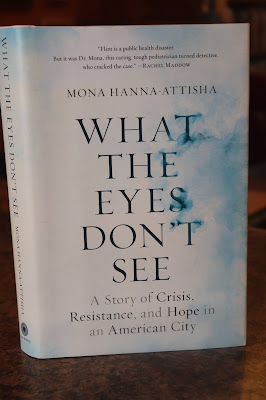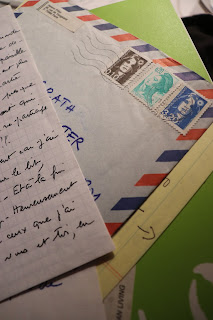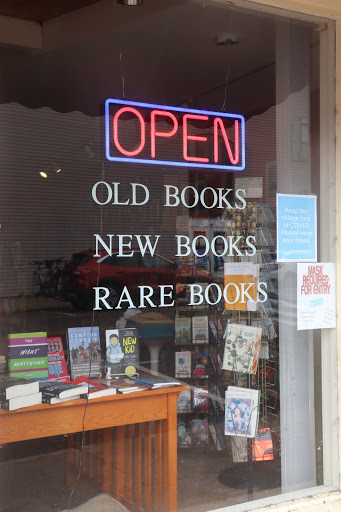 |
| Lake Michigan |
Water: source of life on planet earth, vital and essential to all living things
Children: the future of our species and whatever kind of society our species constructs
Quite frankly, I wasn’t sure I could stand to read Mona Hanna-Attisha’s book about the Flint water crisis, What the Eyes Don’t See. There are so many things wrong these days that it can be hard to sleep through the night and, when night is over, hard to face another morning. But I had to look into the first few pages, at least, and I always enjoy reading first-person accounts of childhoods, particularly when someone grew up in Michigan, and so I launched into reading the author’s prologue.
Then came the painful segue:
This is the story of the most important and emblematic environmental and public health disaster of this young century. More bluntly, it is the story of a government poisoning its own citizens, and then lying about it. It is a story about what happens when the very people responsible for keeping us safe care more about money and power than they care about us, or our children.
The crisis manifested itself in water – and in the bodies of the most vulnerable among us, children who drank that water and ate meals cooked with that water, and babies who guzzled bottles of formula mixed with that water. The government tried hard to convince parents the water was fine – safe – when it wasn’t. But this is also a story about the deeper crises we’re facing right now in our country: a breakdown in democracy; the disintegration of critical infrastructure due to inequality and austerity; environmental injustice that disproportionally affects the poor and black; the abandonment of civic responsibility and our deep obligations as human beings to care and provide for one another. Along with all that – which is a lot already – it’s about a bizarre disavowal of honesty, transparency, good government, and respect for scientific truth.
Stomach-turning. But none of it was news. The Flint water crisis, under the administration of Republican
governor Rick Snyder, made national headlines while the “controversy” was going on (see here for a report on what the governor knew and a complete timeline of the crisis), and I mention the political affiliation of the governor because the story of the crisis does seem, unfortunately, typical of a
party that used to be called “Grand.” The party’s history is one thing, its present reality something very different, not only in recent Michigan history but currently at the national level, “
the very people responsible for keeping us safe care more about money and power than they care about us, or our children” destroying public education, cheaply selling off public lands and resources, rolling back environmental protections, giving the biggest tax breaks to the wealthiest Americans, threatening Social Security, doing everything possible to cripple the postal service (established by the U.S. Constitution they
claim to worship) and to subvert the electoral process with de facto disenfranchisement. This is
not the Republican Party of my parents. Of course, my opinion may not be yours. I realize that.
To be fair, I acknowledge that there was plenty of blame to go around and that one of Dr. Mona’s eventually winning team, much to her astonishment, water engineer from Marc Edwards from Virginia, told her he was a “conservative Republican." Edwards had become so disillusioned in his battle over contaminated water in Washington, D.C., however, that he was dubious about any speedy action -- or any action at all -- taking place in Flint, Michigan.
Anyway, as I say, I wasn’t sure I could handle reading the book about Flint right now. I mean, yet another environmental and human rights and government corruption nightmare! But surely I could manage the final couple pages of the prologue, I told myself, and here is where the subtitle of the book, A Story of Crisis, Resistance, and Hope in an American City, came into play:
Resilience isn’t something you are born with. It isn’t a trait that you have or don’t have. It’s learned. That means that for every child raised in a toxic environment or an unraveling community – both of which take a terrible toll on childhood development and can have lasting effects – there is hope….
Just as a child can learn to be resilient, so can a family, a neighborhood, a community, a city. And so can a country. A country can endure trauma and neglect and become a place where people are cared for, where democracy and equality and opportunity are once again encouraged and advanced….
The title,
What the Eyes Don’t See, of Dr. Mona Hanna-Attisha’s book is so, so important!
What the eye doesn’t see and the mind doesn’t know, doesn’t exist, wrote D. H. Lawrence in
Lady Chatterly’s Lover. Numerous studies of perception have shown (e.g., “
The Trouble with Eyewitness Identification of Testimony in Criminal Cases”), over and over, it’s all too easy for human beings – all of us – to see what we expect to see, much more difficult to notice something that conflicts with our expectations. This important lesson was impressed on Dr. Hanna-Attisha during her pediatric residency by Dr. Ashok Sarnaik.
…When discussing a case and trying to figure out a diagnosis, he watched us run through our limited supply of options, and he always criticized us for not reading enough and therefore not knowing enough, for not seeing the whole picture.
“How can your eyes see something,” he’d say, “that your mind doesn’t know?”
 |
| Lake Huron |
Quick background for those who didn’t follow the Snyder link to find the timeline: The quick-and-dirty general story of Flint’s lead-contaminated water began in April of 2014, when the municipal water supply was switched from the Detroit, which used treated Lake Huron water, to the Flint River, “a toxic industrial dumping site for decades….” Although tap water from the new source looked and smelled and tasted bad, and the city recommended boiling the water before drinking or cooking with it, eventually an all-clear was sounded, and the State of Michigan declared it in compliance with safe water guidelines. General Motors, however, six months after the switch in water supply, was granted a waiver and allowed to return to the Lake Huron supply. Why? Flint River water was “too corrosive.” It corroded engine parts. Offices switched to bottle water. Family homes in Flint, however, despite rashes, hair loss, weight loss, and other more disturbing problems, were told their water was fine.
Fortunately for Flint residents, pediatrician, educator, and hospital researcher Mona Hanna-Attisha had a close friend from high school, Elin Betanzo, who had worked in E.P.A. during the D.C. water crisis, who shook her head at Mona’s question about Flint’s water supply being safe. “No,” she said. “It’s not.”
She did not go looking for a problem or for a cause: the problem and cause came to her as a challenge she had to meet -- because she was a doctor, because her patients were children, because her family tradition was to stand up for others who were threatened. Her parents taught her well.
Dr. Mona, as her young patients call her, and Jenny LaChance, her research coordinator, had no funding for their initial study, and in the beginning, the two of them were the whole team. All they had was their education training, a devotion to children’s health, and obsessive determination to get their hands on the necessary data.
I will not synopsize page by page, day by day, the story Mona Hanna-Attisha tells so capably and movingly in her book, weaving her immigrant family’s experience with an often heartbreaking but ultimately triumphant mission to secure safe water for the youngest residents of Flint, Michigan. And as I have said, the blame for the crisis cannot be laid solely at the feet of one political party. There were elected officials to whom re-election was more important than admitting the problem; officials who had no real power and saw nothing to be gained in rocking the boat; agency people afraid of being labeled trouble-makers and being forced out of their careers; and Flint’s problems had begun long before 2014.
But the author is clear about where she thinks blame lies:
If I had to locate an exact cause of the crisis, above all others, it would be the ideology of extreme austerity and “all government is bad government.” The state of Michigan didn’t need less government; it needed more and better government, responsible and effective government.
As I read about the shameful role of the MDEQ in this sad chapter of Michigan’s history, I couldn’t help thinking back to a former Republican governor John Engler, who eviscerated the Department of Natural Resources, breaking it up into smaller units to create the understaffed and politically vulnerable Department of Environmental Quality, the MDEQ that would have done nothing to protect Flint residents had not a few brave and determined individuals blown the whistle and backed up their whistle-blowing with hard-won facts and analysis until the danger finally became public knowledge. Many government officials and employees and agencies ignored the crisis as long as they could, even denied it when they knew better, but for anyone who thinks the answer is no government and the privatization of everything, please think about how much worse the crisis in Flint could have been without any accountability to an electorate. Governor Snyder had appointed a series of Emergency Managers to run the city of Flint, over and against its elected mayor, to save money, but the governor and his staff were still, ultimately, held responsible. Imagine a corporation in charge of providing water, cutting costs wherever possible to provide the best return to stockholders, with no one responsible for preventing harm to thousands of children living in poverty. Who would care?
One of the several crises facing our nation today in 2020 is that of the coronavirus, COVID-19. And let’s be honest here: we are all tired of wearing masks, weary of keeping a six-foot distance between ourselves and our dear friends, and some of us (though there are a few exceptions, I realize!) very frustrated at not being free to hug anyone outside our close, limited bubble. But one of my favorite overheard remarks this summer came as a group of visitors to Northport were standing outside my bookstore window and looking at the sign thanking Governor Whitmer for keeping us safe, and one of the men said, “I’m a registered Republican, and I think she’s doing a terrific job!”
Dr. Mona Hanna-Attisha is such a successful advocate for children because she has been able to build, from the initial nightmare facts, a program for going forward to build health and resilience in her patients and their community. The United States is in a bad place right now, and I have hope we can pull out of it and move forward together, but we desperately need thoughtful, informed, inspiring leaders with positive programs to bring us together and rebuilt our nation. Name-calling and scapegoating and whining, lying and denying and passing the buck -- that's not the answer. We've had that counter-productive program of destruction for four years. Enough is enough.
And the book I didn't know if I could stand to read? I raced through it in two days, unable to put it down.
---
This, by the way, is my two thousand and tenth post on Books in Northport. The 2,000-mile marker slipped right by me, in the midst of everything else going on. Thank you, though, for staying with me all these years, those of you who have – and for joining me more recently, those of you new to Books in Northport. All readers welcome!


































